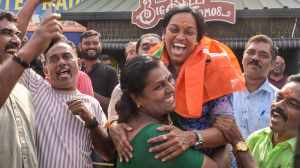Ravi Kapoor focuses on the following steps of pre-writing and writing stages which will help aspirants to write a ‘good essay’ in UPSC Mains.
| Pre-writing stage for UPSC Essays (Steps 1-3) |
Step 1: Understanding and Deconstructing the topic (Previous article: Click here) |
|
Step 2: Ideation and Brainstorming (Previous article: Click here) |
|
Step 3: Structure and Flow (Previous article: Click here) |
| Writing stage for UPSC Essays (Steps 4-8) |
Step 4: How to write an introduction? (Previous article: Click here) |
|
Step 5: What goes in the body? (Previous article: Click here) |
|
Step 6: How to conclude (Previous article: Click here) |
|
Step 7: Essay Extras (Previous article: Click here) |
|
Step 8: Types of content (Previous Article)
|
From last week, we have started to devote one article to each of the dimensions discussed as a part of step 8 and go into the details of the themes, so that you never run out of content while writing an essay on any topic. Last week we discussed Spiritual Essays. Today, let’s talk about Temporal Essays.
Q. Why are UPSC essay topics with temporal dimension challenging?
Essay topics that contain elements of time, history, or the temporal dimension are particularly challenging because they require a deep understanding of historical events, philosophical perspectives on time, and the ability to draw connections between the past, present, and future.
Today, let’s discuss all the types of essay topics that can be asked on the dimension of time and their respective content ideas, along with a solved example and assignment.
Story continues below this ad
Q. What are the key themes in temporal dimensional of UPSC essays?
1. The Cyclical Nature of History: “History Repeats Itself—First as a Tragedy, then as a Farce”
This recently asked UPSC essay topic, based on Karl Marx’s famous observation, suggests that historical events often recur, but the nature of their repetition changes. The first occurrence is significant and tragic, while subsequent repetitions become farcical or absurd. This idea invites an exploration of how history’s lessons are often diluted over time.
Content Ideas:
Discuss the cyclical rise and fall of empires, such as the Maurya and Gupta Empires in ancient India, drawing parallels with the later Mughal and British Empires. This analysis can highlight how similar factors, such as internal decay, economic strain, and external invasions, led to the downfall of these empires.
Explore how the principle of “history repeating itself” applies to modern global events, such as economic recessions or the resurgence of nationalist movements, drawing comparisons with the Great Depression or pre-World War II Europe.
Story continues below this ad
Reflect on how India’s partition in 1947 has echoes in contemporary communal tensions, suggesting that historical grievances can resurface if not adequately addressed.
2. “The Impact of Time on Social Movements and Revolutions”
Essay topics related to this theme explore how the success or failure of social movements and revolutions is often influenced by their timing and the historical context in which they occur.
Content Ideas:
Examine the Indian independence movement, noting how the timing of the Non-Cooperation Movement (1920s) and the Quit India Movement (1942) was crucial, influenced by global events like World War I and World War II. The weakening of the British Empire post-WWII provided a strategic advantage that Indian leaders effectively leveraged.
Compare the outcomes of different social movements within India, such as the Dalit movement led by Dr. B.R. Ambedkar and the feminist movement, analyzing how changing societal attitudes and political climates affected their trajectories.
Story continues below this ad
Discuss how timing played a role in global revolutions, such as the French Revolution and the Russian Revolution, and draw parallels with India’s own struggle for democracy and social justice.
3. “Time as a Healer: The Role of Time in Reconciliation and Social Healing”
This theme delves into the concept that time can play a critical role in healing societal wounds and fostering reconciliation after periods of conflict or injustice.
Content Ideas:
Discuss the process of healing and reconciliation in post-Partition India, where communal violence left deep scars. Over the decades, time, coupled with political efforts like secularism and interfaith dialogues, has played a role in bridging divides, though challenges remain.
Story continues below this ad
Analyze the role of time in addressing caste-based discrimination in India, highlighting how long-term social policies and affirmative action have sought to redress historical injustices, though social attitudes evolve slowly.
Compare India’s experiences with reconciliation processes in other countries, such as post-apartheid South Africa or post-genocide Rwanda, emphasizing the role of time in creating space for healing and forgiveness.
4. “Historical Consciousness and National Identity: How Time Shapes Nations”
This theme examines how a nation’s understanding of its history—its historical consciousness—shapes its national identity and future trajectory.
Content Ideas:
Explore how India’s national identity has been profoundly shaped by its struggle for independence, with events like the 1857 Revolt and the Jallianwala Bagh massacre becoming central to the national narrative.
Story continues below this ad
Discuss the role of historical consciousness in shaping contemporary Indian politics, where historical figures like Mahatma Gandhi, Jawaharlal Nehru, and Subhas Chandra Bose are invoked to legitimize political ideologies.
Analyze how regional histories, such as the Dravidian movement in Tamil Nadu or the Maratha pride in Maharashtra, contribute to the broader mosaic of Indian identity, demonstrating how diverse historical narratives coexist and sometimes conflict within the nation.
5. “The Evolution of Timekeeping and its Impact on Civilization”
This theme aligns with the 2017 essay topic, “The past is a permanent dimension of human consciousness and values.” It explores how the development of timekeeping has influenced human civilization, reflecting the enduring impact of the past on contemporary life.
Content Ideas:
Discuss the evolution of timekeeping in India, from ancient water clocks (Ghatika Yantra) and sun dials to the adoption of the Gregorian calendar during British rule. Reflect on how this shift in timekeeping was part of the broader colonial project of restructuring Indian society along Western lines.
Story continues below this ad
Analyze the impact of standardized time zones introduced by the British in India, particularly how the synchronization of time across vast territories facilitated the administration and economic exploitation of the colony.
Explore the cultural significance of time in India, such as the use of the lunar calendar in religious festivals and the importance of “Mahurat” in rituals, demonstrating how traditional concepts of time coexist with modern timekeeping practices.
6. “The Intersection of Time, Space, and Existence: Understanding Human Life Through the Temporal Lens”
This theme could be connected to the 2020 essay topic, “Life is a long journey between human being and being humane.” It invites exploration of how different cultures understand the relationship between time, space, and human existence, shaping human life and civilization.
Content Ideas:
Story continues below this ad
Discuss the cyclical concept of time in Indian philosophy, particularly the notion of Yugas (epochs) in Hinduism, and how this influences the Indian worldview, where history is seen as a series of recurring cycles rather than a linear progression.
Compare this with the linear concept of time in Western thought, influenced by Judeo-Christian traditions and later by Enlightenment ideas, which sees history as a continuous march towards progress.
Reflect on how modern technology, such as the internet and digital communication, is compressing time and space, altering human interactions, and challenging traditional notions of temporality and existence.
Q. How to structure temporal essays of UPSC CSE?
Structuring the Essay
To effectively address these themes in an essay, it is crucial to maintain a well-organized structure:
1. Introduction: Begin by introducing the concept of time and its relevance in historical analysis and human experience. Briefly outline the specific theme or topic of the essay and its importance in understanding broader societal trends.
2. Main Body:
Historical Examples: Incorporate relevant historical examples, especially from Indian history, to illustrate key points. Use these examples to demonstrate how time and historical events are interconnected and influence each other.
Philosophical Insights: Weave in philosophical perspectives on time, drawing from both Indian and Western thought, to provide depth to the discussion.
Contemporary Relevance: Connect historical and philosophical insights to contemporary issues, showing how the theme continues to be relevant in today’s world.
3. Conclusion: Summarise the key arguments made in the essay, reflecting on the broader implications of time and history in shaping human civilization. Emphasise the importance of understanding the temporal dimension in making informed decisions for the future, and perhaps suggest areas for further reflection or action.
The UPSC Essay Exercise
Subscribe to our UPSC newsletter and stay updated with the news cues from the past week.
The UPSC articles of Indian Express is now on Telegram. Join our Telegram channel- Indian Express UPSC Hub and stay updated with the latest Updates. For your answers, queries and suggestions write at manas.srivastava@indianexpress.com.


































